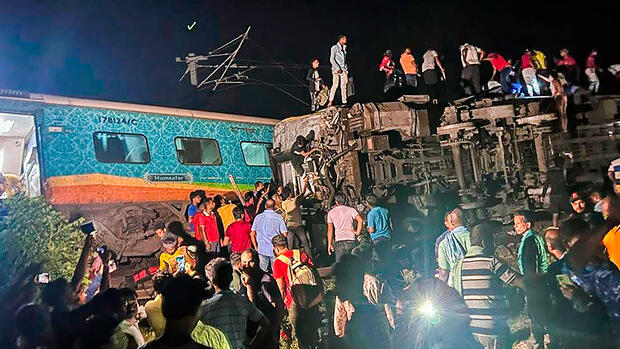It is one of the worst train accidents in India in recent decades.
(Photo: dpa)
New Delhi At least 238 people died in one of the worst train accidents in recent decades in eastern India. In addition, around 900 people were injured, as the authorities in the state of Odisha announced on Saturday morning. The rescue work was made more difficult during the night – it is to be feared that the number of victims will continue to rise.
The disaster happened on Friday evening around 7 p.m. local time (3 p.m. CEST) in a rural area of the Balasore district, a good 200 kilometers southwest of Kolkata (formerly: Calcutta). Two passenger trains and one freight train crashed there one after the other on two parallel track sections. Exactly how, even hours after the accident, it was still not clear.
According to media reports, one of the two passenger trains probably derailed first, and the other then crashed into the wagons that were left on the tracks on the parallel route a few meters away. Which of the two trains derailed first and for what reason remained unclear at first.
It was also initially unclear whether the freight train was really parked on another track at the time of the accident and was rammed by one of the derailed passenger trains, as some media described. Others gave different versions of what happened.
As dawn broke on Saturday, the extent of the disaster became more apparent. About a dozen wrecked cars lay on and off the tracks, steel behemoths rearing up, some with compartment ceilings torn open, windows shattered.
Rescue operation with cranes and bulldozers
On and next to the carriages, dozens of helpers in civilian clothes and rescue workers in orange protective suits tried desperately to rescue injured passengers under the heavy rubble. Cranes and bulldozers were also brought in, it said.
An eyewitness told local television station NDTV that he was jolted out of his sleep when his train suddenly derailed – and chaos broke out. “10 to 15 people fell on me,” he told the station. He himself escaped with injuries to his neck and hands, but then saw dead bodies and severed body parts everywhere.
“It was a deafening noise, I felt the ground tremble under my feet. Our train was thrown back and forth,” a passenger was quoted as saying by the Times of India newspaper. Then he looked out the window and saw the derailed wagons with people trapped underneath.
The sight was too awful to describe. an eyewitness
“It was dark and I could hear screams.” Another man described how the devastated later searched for relatives in a field of mutilated people. “The sight was too horrible to describe.”
India has a large and historically grown railway network. With many old trains and track systems in need of overhaul, accidents are common. But such high numbers of victims are extremely rare even in the most populous country in the world with 1.4 billion inhabitants. The accident shocked many in the country and rekindled discussions about safety on the railway.
Problems persist despite investments
A lot has been invested in rail in India in recent years, but problems persist. The Odisha government made Saturday a day of mourning. Many trains were canceled or diverted.
The willingness to help after the accident was great. Hours later, there were reports that many people in hospitals wanted to donate blood for the injured. “I hope this saves some lives,” a donor told Indian news agency ANI. Odisha’s chief administrator, Pradeep Kumar Jena, said he had received many inquiries from people interested in donating blood.
Railway Minister Ashwini Vaishnaw told ANI news agency that he had ordered an investigation into the cause of the train crash. He arrived at the scene of the accident on Saturday morning to assess the extent of the tragedy. Prime Minister Narendra Modi was shocked and wrote on Twitter: “At this hour of sadness, my thoughts are with the grieving families.”
Shortly after the accident, the prime minister’s office announced – as is customary in India for infrastructure-related accidents – compensation for the relatives of the dead of 200,000 rupees (about 2,300 euros) each. The injured are said to receive around 50,000 rupees.
More: India drives growth
